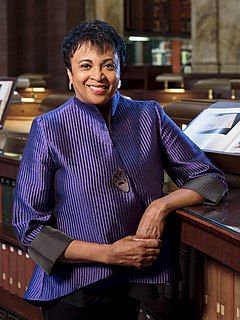A Quote by Tom Peters
We often hear that the digital age has resulted in a devaluing of time, space, and place. But I wonder if theseclaims are exaggerated.
Quote Topics
Related Quotes
Silence is something more than just a pause; it is that enchanted place where space is cleared and time is stayed and the horizon itself expands. In silence, we often say, we can hear ourselves think; but what is truer to say is that in silence we can hear ourselves not think....In silence, we might better say, we can hear someone else think.
In this digital age, there is no place to hide behind public relations people. This digital age requires leaders to be visible and authentic and to be able to communicate the decisions they've made and why they've made them, to be able to acknowledge when they've made a mistake and to move forward, to engage in the debate.
If you need to strap a camera to you or get in a small space, then it makes sense to use digital.I do think it is possible to use a digital camera artistically, but it can only be good if you are using film technique. Film has grain, and digital has pixels, and there is not that much of a difference, but digital does not replace the need to create a scene and light it properly and spend time considering the shot.
We live in the digital age and, unfortunately, it’s degrading our music, not improving it It’s not that digital is bad or inferior, it’s that the way it’s being used isn’t doing justice to the art. The MP3 only has 5 percent of the data present in the original recording. … The convenience of the digital age has forced people to choose between quality and convenience, but they shouldn’t have to make that choice.
Aristotle said that philosophy begins in wonder. I believe it also ends in wonder. The ultimate way in which we relate to the world as something sacred is by renewing our sense of wonder. That's why I'm so opposed to the kind of miracle-mongering we find in both new-age and old-age religion. We're attracted to pseudomiracles only because we've ceased to wonder at the world, at how amazing it is.
People over the age of thirty were born before the digital revolution really started. We've learned to use digital technology-laptops, cameras, personal digital assistants, the Internet-as adults, and it has been something like learning a foreign language. Most of us are okay, and some are even expert. We do e-mails and PowerPoint, surf the Internet, and feel we're at the cutting edge. But compared to most people under thirty and certainly under twenty, we are fumbling amateurs. People of that age were born after the digital revolution began. They learned to speak digital as a mother tongue.
The digital age is for me in many ways about temporal wounding. It's really messed up our ontological clocks. In the digital economy, everything is archived, catalogued, readily available, and yet nothing really endures. The links are digital encryptions that can and won't be located. That will have to be reassembled over time. It won't be exactly what it was. There will be some slightly altered version. So the book is both an immaterial and material artifact.
We're in a digital age where it's cool to be on your iPhone all the time. All of out-of-school activities my daughter has such as piano one day and acting another day and dance another day are about getting her away from that. People are on video games and their phones, and it's taking up all their mental space.
Digital is clearly the way forward as can be seen from the numerous marketing efforts undertaken to promote a film today. Besides, we at T-Series are firm believers and followers of the digital age. It was only befitting that I join the social media universe and engage with the audience on a real time basis.
Musing takes place in a kind of meadowlands of the imagination, a part of the imagination that has not yet been plowed, developed, or put to any immediately practical use…time spent there is not work time, yet without that time the mind becomes sterile, dull, domesticated. The fight for free space — for wilderness and public space — must be accompanied by a fight for free time to spend wandering in that space.




































